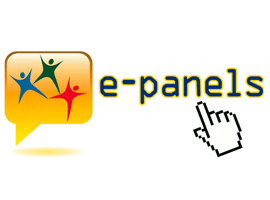
AT A GLANCE
The E-panels project is designed to address the issue of bridging the gap between citizens and the European Union in an innovative way. As we know citizens panels, which are the groups of ordinary citizens who are not spontaneously involved in EU affairs, are frequently used solution to cooperate with citizens and to share the ideas about the future of the European Union with its outcomes on the citizens. The new method proposed by this project is to create electronic panels (“E-panels”) to increase the number of citizens from different ages, nationalities and backgrounds who could finally find an opportunity to express themselves on matters related to EU policies that affect their daily life by these online panels. The aim is to test this new dimension of the citizens’ panels’ methodology to see if it is a relevant instrument to foster citizen participation.
Bringing the EU closer to the citizens is one of the biggest challenges the EU is facing today. The project paid attention to the need to promote and explain the “European project” to citizens, but also to involve them in its definition itself.
OBJECTIVES
By the E-panels project we would like to develop a sense of European identity, based on common values, history and culture, to give to the citizens the opportunity to interact and participate in a broaden Europe through debates about how to improve citizens’ participation, with a focus on tools or processes such as ICT tools and the process of volunteering, to foster a sense of ownership of the European Union among its citizens, and to enhance tolerance and mutual understanding between European citizens, respect and promote cultural and linguistic diversity, while contributing to intercultural dialogue.
The E-panels project aims particularly at:
Consolidating the methodology of “citizens’ panels”, with a new dimension, i.e. the e-dimension, in line with the European Year of Creativity and Innovation 2009
Widening the number of participants in panels involved through the use of ICT and online forum
Generating discussion on a specific theme, i.e. citizen participation in Europe and what role volunteering can play in this regard
Including candidates countries (and potential one) in this process, in order to foster citizen participation about EU issues in the wider Europe, developing thus an inclusive mechanism

The E-panels project will permit to:
- Collect the opinion of citizens on some key European challenges for the future: During the implementation process, the project will collect opinions of citizens from 6 countries, 3 EU members states and 3 pre-accession countries, enabling thus to also gather the opinions from future EU citizens on key issues such as how to improve citizens participation, with a focus on ICT and volunteering;
- Create mechanisms that allow European citizens to develop civic competences to formulate their views and opinions on the European integration process in the form of recommendations for policy makers at European level;
- Encourage the dialogue between European citizens and the institutions of the EU: During the final conference, the formulated recommendations will be submitted to the EU officials and this will give the opportunity to the citizens to interact directly with them.
ACTIVITIES
International launching conference, 3rd and 4th March 2010 in Skopje, Macedonia
The conference introduced the topics that will be developed by the e-panels, and will widely promote the project – it will gather all the partners of the projects and the panels’ activators.
E-panels launching conference took place in Skopje on 3rd and 4th March 2010, gathering 100 participants on the both days (locals and internationals). The conference was very successful and resulted with a lot of ideas and different directions for the project.
Trainings of citizens’ panels activators/partners and preparation of a Kit for e-Panels, 27th to 29th April in Brussels
The aims of this activity are to gather citizens’ panels activators and partners from the different partners’ countries to create a transnational group and train them on the topics of active citizenship in EU context, volunteering and the use of ICT, to visit EU institutions and meet EU officials, to bridge the gap between EU citizens and institutions and to produce a “KIT” on how to set-up an “e-panel”.
METHODOLOGY
Participatory approach : citizens at the centre of the process
The present proposal is based on participatory methods which aim at involving citizens in all the different steps of the project. The employed methodology will be characterised by an active interaction between all the actors involved (citizens, local authorities, EU Institutions…), in order to encourage and support the active participation of citizens and to promote the dialogue between them and the Institutions of the EU.
IT methods and tools will thus be extensively used to encourage and facilitate interaction and participation. The aim is to test this new dimension of the citizens’ panels’ methodology to see if it is a relevant instrument to foster citizen participation.
Citizens’ panels are groups of ordinary citizens who are not spontaneously involved in EU affairs. In order to create these flexible (since online) citizens’ panels, the partners will proceed as follow:
- they will select 3 citizens’ panels activators, i.e. already active citizens (involved in the local life, in NGOs, LAs, as volunteers). Among these 3 citizens’ panels activators, one will be selected for its ICT knowledge and skills to facilitate the creation and management of the online panel (it can be one staff member of the partner organisation).
- these citizens’ panels activators will then have to find around 10 participants each for the panel
- finally, an open call will be launched in the media by the partner to find additional citizens for the panel.
All the interested people will have the opportunity to get information about E-Panels, the project and the EU during the Info-Day to be organised locally on the 9th May.
Citizens’ panels should involve about 40-50 people. But as a flexible tool, in particular when done though online workshops, the number of people can fluctuate from one workshop to another. The people may also change. However, the creation of a core team of about 15 -20 people, involved during the whole implementation, is expected in order to ensure continuity.
